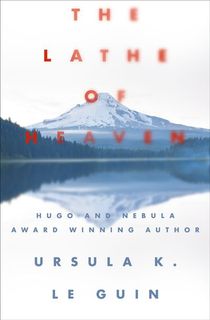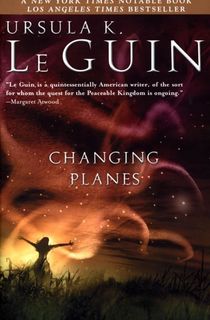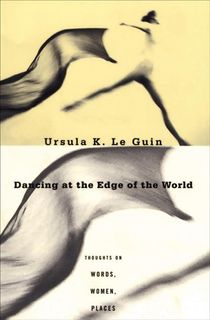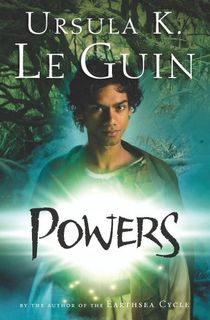Ursula K. Le Guin was born on October 21, 1929 in Berkeley, California to her anthropologist father and her mother, a writer. She submitted her first sci-fi story to a publication at age eleven, and although the story was rejected, she continued to write until her death at the age of 88 on January 22, 2018.
Le Guin wrote mainly in the sci-fi and fantasy genres, winning the Hugo Award, Nebula Award, Locus Award, and World Fantasy Award, but she preferred to think of herself as an American novelist. She was first officially published in the 1960s; her vast body of work includes essays, novels, short stories, and poetry. Often, her writing explored topics like feminism, politics, religion, and the natural environment.
She spent most of her adult life in Portland, Oregon with her husband and children, and was made a Grand Master of Science Fiction in 2003. Le Guin was outspoken on topics she believed in, and she had a way with words that was incredibly moving, no matter the topic. Here are nine of Le Guin’s most stirring quotes.
“Gentlemen, I just don’t belong here.”
In 1987, Le Guin was asked to write a blurb for an upcoming collection of works edited by George Zebrowski. However, she declined to write the blurb due to the anthology's exclusion of women. Though the collection, Synergy: New Science Fiction, Volume 1, was meant to showcase established and up-and-coming science fiction authors, there were no women included.
Le Guin famously sent back a brief letter declining to write a blurb, and chastised the editor for perpetuating the boy’s club of fiction. She ended her four-sentence-long letter by proclaiming that her voice did not belong in their exclusionary locker room.
RELATED: 5 Things Every Fantasy Writer Can Learn from Earthsea

Young Le Guin, in a photo seen in the upcoming documentary Worlds of Ursula K. Le Guin.
Photo Credit: Worlds of Ursula K. Le Guin"I didn't see why everybody in heroic fantasy had to be white [...] It didn't even make sense."
As the daughter of an anthropologist and a writer, Le Guin was always careful to avoid imperialism in her writing. But as she stated in an essay for Slate in 2004, the majority of characters in her Earthsea trilogy were not white, and that was no accident. When the Earthsea film rights were sold, Le Guin was disappointed to find that they’d whitewashed her characters, including Ged, who was a main character and a rare example of a person of color in sci-fi. Le Guin responded by explicitly criticizing the Sci Fi Channel's adaptation of her books, and explaining why she made the decision to write a speculative fiction series that challenged the white-as-default narrative often prevalent in fantasy.
Throughout Le Guin’s life and writing, she worked hard to be on the forefront of inclusion.
RELATED: Watch the First Trailer for the Long-Awaited Ursula K. Le Guin Doc
“Too many imaginative babies were going out with the bathwater. Too many critics and teachers ignored – were ignorant of – any kind of fiction but realism.”
This quote from an interview with Le Guin in The Guardian gives more insight on her feelings about being pigeon-holed as a great sci-fi writer, as opposed to just a great writer. Throughout her writing career, Le Guin fought to be seen as an “American novelist.” Though she did grow up reading science fiction, she stated in a New Yorker interview that she spent much of her spare time reading authors that influenced her like Virginia Woolf and Leo Tolstoy.
It can be difficult to be taken seriously as an author if your work does not fall into the literary fiction genre. However, Le Guin was certainly recognized as a great American novelist as her career went on and as she became more known. After the release of a collection of her works, The Complete Orsinia, Le Guin was published by the Library of America, an honor bestowed only on the best writers.
RELATED: 7 Must-Read Tolkien Books for The Lord of the Rings Fans
“People who deny the existence of dragons are often eaten by dragons. From within.”
Although Le Guin was referencing disregard for fantasy in this quote, it also applies to her attitude towards confronting hard things in life and pushing through with all your might.
She spent her life pushing past barriers set in place for sci-fi writers and also for women. She knew the limits that people tried to put on her, but by trusting herself and her own talent, she did not deny the existence of issues put in her tracks. Instead, she confronted every dragon she encountered and never let anything demoralize her from within.
RELATED: 10 Best Books on Writing by Sci-Fi and Fantasy Writers

Le Guin with Harlan Ellison at Westercon in 1984.
Photo Credit: Wikimedia Commons“There's a point, around the age of twenty, when you have to choose whether to be like everybody else the rest of your life, or to make a virtue of your peculiarities.”
In her book The Dispossessed, Le Guin explored themes of Taoism, anarchy, feminism, and utopia. This quote lends itself to the idea of accepting your differences and yourself in general.
Making a virtue of your exceptions is a philosophy that Le Guin practiced throughout her life, perhaps because she was raised by parents who encouraged their children to respect other cultures. She was excited to explore the differences she had with others.
“If you evade suffering you also evade the chance of joy. Pleasure you may get, or pleasures, but you will not be fulfilled. You will not know what it is to come home.”
Exploring more of the ideas behind Taoism, this passage from The Dispossessed focuses on the balance between suffering and joy. To experience joy, you must also feel the pain of suffering.
While much of Le Guin’s life was not easy in terms of being a woman in literature, there were also great moments of recognition throughout her 88 years on earth. One of the most moving parts of this quote is the idea of coming home to your joy. At the end of the day, what more can we ask for than to think back on every piece of happiness made so much sweeter by the hard climb it took to get to that place of joy?
RELATED: 5 Things 'Serious' Fantasy Writers Can Learn from Terry Pratchett
“You will die. You will not live forever. Nor will any man nor any thing. Nothing is immortal. But only to us is it given to know that we must die. And that is a great gift: the gift of selfhood.”
The cycle of life was something that Le Guin wrote about often in her Earthsea series. Though eternal life doesn’t exist, it’s a recurring theme in many sci-fi and fantasy stories, Le Guin’s included.
This quote from the third Earthsea novel, The Farthest Shore, explores the inevitability of death, and the cycle of movement in life and its place in the world.
To see life as more than a bright beginning and an ending spent underground for eternity, Le Guin chose to compare life to a wave. The sea is both ever-changing and cyclical. The same can be said for life. Death is a part of living, and just because it’s frightening does not mean it’s bad. Selfhood is a gift, and so is the knowledge that after us will be a new wave, and another one behind it.
“Love doesn't just sit there, like a stone, it has to be made, like bread; remade all the time, made new.”
Le Guin's novel The Lathe of Heaven imagines a world with infinite possibilities in a limited, dystopian Portland, Oregon. While her characters suffered to accept new realities and the faults of humankind, they also experienced joy in the love they felt for each other.
Le Guin had her own relationships and family, and she certainly had knowledge about what it takes to make love work. In this quote, she eloquently explains the less romantic, rarely-discussed side of love — the work. For while love may be easy, it also requires an elegance in age and change, which is what the characters in The Lathe of Heaven found themselves struggling with in love and in life.
“It is good to have an end to journey towards; but it is the journey that matters, in the end.”
The Left Hand of Darkness follows a journey through planets, genders, and loyalty. This quote is a metaphor not only for the book as a whole, but also for Le Guin’s life. Le Guin defied odds to to become one of the greatest writers of the 20th century, and she hit many different landmarks on her path to “success.”
However, Le Guin believed the journey as a whole was the actual success. Le Guin wrote until she died, though her son stated that at the end of her life she wrote mostly for herself. Being a writer is not always the easiest profession, especially when your genre is dominated by men, and your writing explores feminism and social issues, but Le Guin’s tenacity was evident throughout her life. That same determination is still evident today in her legacy.
Want more great books by Ursula K. Le Guin? Check out some of her other must-read titles below!
[Via The New Yorker, The Guardian, and Slate]







